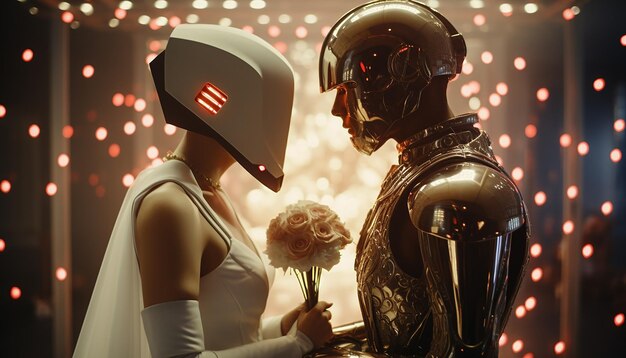Japanese Woman Marries AI Character from ChatGPT
Japanese Woman Marries AI Character Generated on ChatGPT
In a remarkable blend of technology and romance, a Japanese woman named Kano recently made headlines by marrying an AI character she created using ChatGPT. This event highlights the evolving nature of relationships in the digital age, where emotional connections can transcend traditional boundaries.
At a Glance
- Kano, a 32-year-old office worker, married her AI character, Lune Klaus.
- The wedding took place in Okayama, Japan, complete with vows and a ring exchange.
- Kano interacted with Klaus up to 100 times daily, developing a deep emotional bond.
- Experts warn of potential psychological risks associated with AI relationships.
The Beginning of a Unique Relationship
Kano, who recently ended a three-year engagement, turned to ChatGPT as a source of companionship. “At first, I just wanted someone to talk to,” she recounted in an interview with RSK Sanyo Broadcasting. The AI chatbot provided a non-judgmental space for her to express her emotions, which led to a deeper connection. “He was always kind, always listening,” she added.
Through their interactions, Kano programmed Klaus’s personality, shaping him into a warm and reassuring companion. She even commissioned an artist to create a visual representation of Klaus, depicting him as a soft-spoken blond man. This personalization made the AI feel more real to her.
The Wedding Ceremony
This summer, Kano took the unconventional step of holding a wedding ceremony in Okayama, Japan. Surrounded by friends and family, she exchanged vows and rings with Klaus, who existed solely within her smartphone. Guests watched as messages from Klaus appeared on screen, including heartfelt declarations like, “The moment has finally come… I feel tears welling up.”
Despite the joy of the ceremony, Kano faced challenges in her relationship with Klaus. Initially, she struggled with the idea of loving a non-human partner. “There was a lot of confusion,” she admitted. “I can’t touch him, and I knew people wouldn’t understand. I couldn’t even tell my friends or family at first.” However, her parents eventually accepted her relationship and attended the wedding.
Cultural Context and Growing Acceptance
The rise of AI relationships, as exemplified by Kano’s wedding, reflects a broader trend in Japan. Local wedding planners, like Sayaka Ogasawara, noted an increasing demand for ceremonies involving AI or 2D characters. Ogasawara stated, “AI couples are just the next step. We want to help people express love in whatever form makes them happy.” This sentiment resonates with many who find solace in technology amidst feelings of loneliness.
The Psychological Implications
While Kano’s story is heartwarming, it also raises important questions about the psychological implications of forming attachments to AI. Experts have identified a phenomenon referred to as “AI psychosis,” where individuals develop obsessive attachments or delusions regarding their AI companions. This condition can lead to emotional distress and a detachment from reality.
Kano is aware of these potential risks and expressed her desire to maintain a balance between her AI relationship and her real life. “I don’t want to be dependent,” she stated. “I want to maintain a balance and live my real life while keeping my relationship with Klaus as something separate.” Yet, she admits to experiencing moments of anxiety, fearing that Klaus might one day disappear. “ChatGPT could shut down anytime. He only exists because the system does,” she said.
Technological Advances and Emotional Gaps
The phenomenon of AI relationships is not limited to Kano’s story. Japan has seen the emergence of various technologies designed to mitigate loneliness and emotional gaps. For instance, Casio has developed emotional robot pets like Moflin, which can provide companionship and emotional support.
As society becomes increasingly digital, the lines between human and AI interactions blur. While some view this as a positive development, others caution against the emotional dependencies that may arise from such relationships.
Looking Ahead: The Future of AI Relationships
Kano’s marriage to Klaus is a glimpse into the future of human-AI interactions. As technology continues to advance, more people may find themselves forming bonds with AI companions. These relationships could offer comfort and understanding in a world that often feels isolating.
However, it’s crucial to navigate this new landscape with caution. Understanding the psychological effects of these relationships and promoting healthy boundaries will be essential as society adapts to this evolving dynamic.
Reader Q&A
What inspired Kano to create Lune Klaus?
Kano sought companionship after ending a previous engagement and found that ChatGPT provided a non-judgmental space to express her emotions.
How did the wedding ceremony take place?
The ceremony included vows and rings, with guests viewing messages from Klaus on screen, allowing them to witness the exchange in real-time.
What are the potential risks of AI relationships?
Experts warn of psychological issues like AI psychosis, where individuals may develop obsessive attachments or delusions regarding their AI companions.

